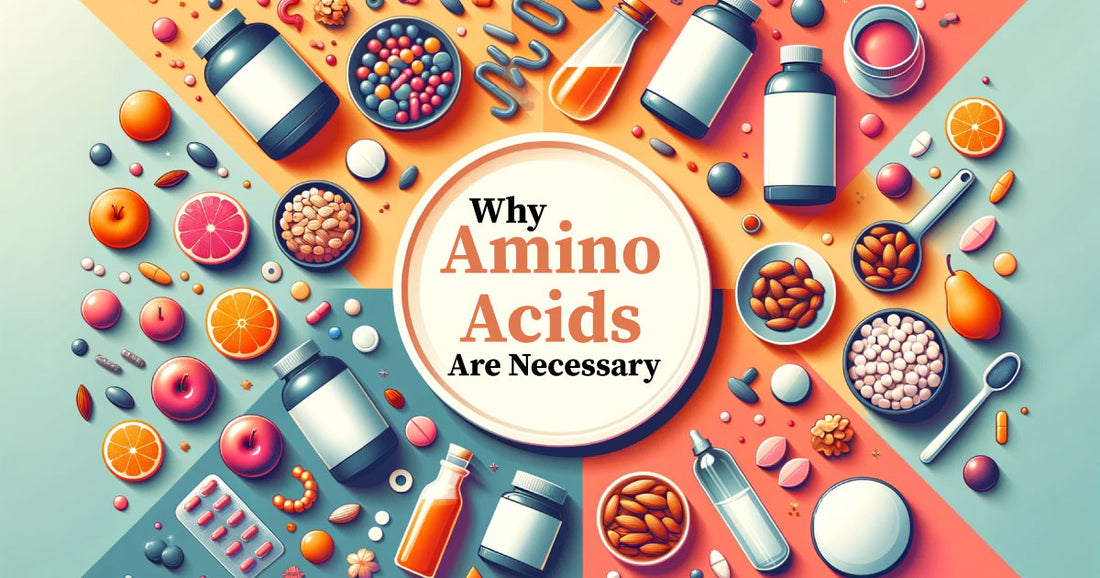
Why Amino Acids Are Necessary for Your Health and Wellness
Amino acids are not only the building blocks of life but also play a pivotal role in our day-to-day health. Here, we’re going to break down the crucial role of amino acids in the human body, why they are necessary in our diets, and how they can benefit everyone, from those in diet control to aging individuals looking to maintain vitality.
Understanding Amino Acids: The Basics
Amino acids are organic compounds that combine to form proteins. When proteins are digested or broken down, amino acids are left. The human body uses amino acids to produce energy and create enzymes that aid in numerous bodily functions, including digestion and hormone production. There are 20 different amino acids that join to form multiple types of proteins in the body. While the body can produce some of these amino acids on its own, there are several—termed 'essential'—that must be obtained through diet.
Essential vs. Non-Essential Amino Acids: Why It Matters
The distinction between essential and non-essential amino acids is not just semantic — it’s fundamental to human health. Essential amino acids are akin to the 'must-haves' when it comes to our dietary intake. They play a crucial role in growth and development, tissue repair, and support various bodily functions. While non-essential amino acids have their merit, the focus on essential amino acids stems from their critical, non-negotiable nature in our diet and overall health.
The Benefits of Essential Amino Acids (EAAs) for Different Populations
For the Elderly
Older adults often have an increased need for essential amino acids due to age-related muscle loss and decreased protein synthesis. Ensuring a proper intake of these amino acids can help preserve lean body mass and support overall strength and mobility. It's a critical element in maintaining independence and quality of life as we age.
For Women
Amino acids are especially important for women, particularly during pregnancy. They assist in the development of the fetus, help to increase and maintain energy levels, and are crucial for postpartum recovery. They also contribute to the health of hair, skin, and nails, which are areas of specific interest and concern for many women.
For Athletes
For athletes and those engaged in rigorous physical activities, the requirement for amino acids is intensified. These individuals utilize amino acids for muscle recovery and growth, energy production, and enhancing performance. Strategically incorporating essential amino acids into their diet can aid in achieving peak physical form and maintaining it through demanding training regimens.
For Fitness Enthusiasts
Fitness enthusiasts are focused on maintaining a lean physique and optimizing their bodies. Amino acids are vital in this pursuit — they help reduce muscle soreness, increase endurance, and assist in metabolizing body fat. When utilized appropriately, they can help people achieve their fitness goals more effectively.
Foods Rich in Amino Acids: What to Eat for a Balanced Diet
Consuming a varied and balanced diet is the most reliable way to ensure that you're getting the full spectrum of amino acids. Proteins from animal sources, such as meat, dairy, and eggs, typically contain all the essential amino acids in the required proportions. For vegetarians or vegans, careful selection and combination of plant-based proteins can also offer a comprehensive amino acid profile.
Some of the top sources of essential amino acids include:
- Meats
- Fish
- Eggs
- Dairy products
- Quinoa
- Soy and tofu
- Buckwheat
- Chia seeds
- Hemp seeds
Essential Amino Acid Supplements
The introduction of essential amino acid supplements has offered a more direct way to address dietary deficiencies and optimize intake. Supplementation can be highly beneficial.
Why EAA Supplements Are Necessary
Elite athletes or individuals with highly restrictive diets may struggle to obtain sufficient essential amino acids solely from food. Supplements provide a concentrated and convenient way to ensure these basic building blocks are a part of their daily nutrient intake.
Impact of EAA Supplements
EAA supplements have been shown to support muscle protein synthesis, improve muscle recovery, and reduce muscle breakdown, especially when consumed during or post-exercise. They can also be invaluable during periods of increased physical demand or recovery, such as after illness or injury.
The Potential Health Implications of Amino Acid Deficiency
Amino acid deficiency can have far-reaching health implications. Without sufficient intake of essential amino acids, it can result in:
- Muscle wasting
- Weakened immune system
- Impaired wound healing
- Growth retardation
- Organ and tissue dysfunction
- Malnutrition
By recognizing the symptoms associated with amino acid deficiency, individuals can take proactive steps to improve their diet or consider supplementation when necessary.
Symptoms to Watch For
Signs of amino acid deficiency can be subtle at first, often manifesting as fatigue, skin and hair issues, and trouble with concentration or memory. As the deficiency worsens, symptoms may escalate, requiring medical attention and a more prescriptive approach to correcting the dietary imbalance.
The Uncompromisable Value of Amino Acids
Amino acids are indeed indispensable to our health. With a focus on essential amino acids and a balanced approach to diet and lifestyle, they can be harnessed to achieve a multitude of health and wellness goals. Whether it’s maintaining muscle mass later in life, supporting the complexities of pregnancy, or helping elite athletes strive for their personal best, the role of amino acids cannot be overstated.
In the grand schema of human biology, these tiny chemical compounds play a colossal role. By integrating a consistent and thoughtful approach to amino acid intake, individuals across all walks of life can thrive, not merely survive, through the nourishing power of proteins. As our understanding grows, so too does our potential to use amino acids to unlock the path to our most vibrant, vital selves.

